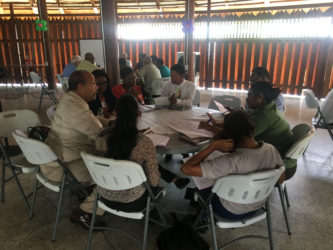Minister of Natural Resources Raphael Trotman says the review of the National Forest Policy Statement (NFPS) and National Forest Policy (NFP) is timely.
He was speaking yesterday at the first stakeholders’ consultation.
Giving the welcome remarks at the Umana Yana, Trotman pointed out that the revision is timely, given that the policy was last reviewed in 2011 and there have since been major changes globally.
“Much has happened since this revision was done in 2011. We’ve had the Paris conference (on climate change). We’ve had a change in the White House. We’ve had matters even arising here,” Trotman noted, while pointing out that even though persons might have a general perception of the forest sector that is twisted, there has since been many positive changes over the years.

As such, Trotman said that attention was paid to the negative side of the forest industry and insufficient attention was paid to the value of the forest and the role it plays in sustaining lives in communities and globally, around the world. “…And so it is with great pleasure that the Ministry of Natural Resources working with its developmental partners agreed to this process,” Trotman said.
Reflecting on the evolution of the forestry sector in Guyana, Trotman said that there has been a movement from “a period of just seeing logs being hauled.”
“…But I believe one gets a better sense that there is an order coming to our sector. One gets a sense as we discussed only two days ago that our other species, our lesser used species of Guyana, will be paid more attention and hopefully utilized by both government and private contractors in future home building and various other applications,” Trotman noted.
“So against the backdrop of changing circumstances, globally and nationally, we are happy that this review is taking place and out of which we will have a policy that all of us; government, civil society and citizens, can feel happy and comfortable,” Trotman said, while adding that sustainable use of the forest should be the top priority when the discussions for the policy is being done.
The review of the NFPS and NFP is being facilitated by The Consultancy Group (TCG), which is spearheaded by Dr. Rory Fraser, who was awarded the contract in November last year. According to Fraser, the Group started their work as early as February, where they began engaging the various stakeholders.
“I think we have a complement of people who can really help to understand the breadth of interest and activities in the forest and how maybe we need to coalesce and make something much more comprehensive and coherent about this particular patrimony,” Fraser said, while adding that even though they might be aware of what’s going on in the sector, they are not the experts and are just facilitating the discussions with the real experts in the field.
Fraser explained that the purpose of the project was to develop a policy and plan in support of the policy, as well as programmes and activities in support of the plan, along with ways of monitoring and evaluating their accomplishments. He added that the Group has recognized that the true strength of the policy does not lie in the documents produced, but the framework that is established and the mechanisms by which it is implemented, which keen attention needs to be paid to.
“Everyone would tell you that policy is dynamic, it needs to be flexible, it needs to be anticipatory, it needs to have an understanding of what the future holds and prepare us for that,” Fraser highlighted, while stating that the plan needs to be flexible and responsive to the needs and concerns of the people.
While a normal project of this sort would take some 18 months, Fraser pointed out that the Group will complete it by the end of August and plans to have six more consultations countrywide. Fraser added that in addition to persons who are privy to the forest sector, there needs to be representatives from every other sector through the country, whether they are directly or indirectly affected by the forestry sector.
“So this discussion we want to ensure is fully engaged by Guyanese,” he said.
Present at the launch and first consultation meeting were representatives from: the Guyana Geology and Mines Commission, Guyana Gold and Diamond Miners Associa-tion, Ministry of Agriculture, Ministry of Indigenous Peoples’ Affairs. Guyana Manufact-uring and Services Assoc-iation, Forest Products Association, University of Guyana, Guyana Lands and Surveys Commission and various other stakeholders.
After the introductory presentation, the representatives were divided into groups where they took part in discussions about what’s working well with the current NFP and NFPS, what new and emerging issues are to be considered and what challenges and ideas they would like to see highlighted and considered in the new draft.
After the group decisions, the participants were asked to highlight their findings and recommendations.
In terms of what is currently working about the NFP and NFPS, the groups pointed out the fact that there is a policy is something positive and from what they’ve discussed it covers all the notable areas and cuts across all of the relevant sectors.
In terms of the recommendation and what is not working, the groups highlighted that there is a need for: a reduced restriction on certain species, an improvement on the dissemination of information to the relevant stakeholders, more financial incentives for value added products, a clause in the policy that caters for needs and addresses the unfair distribution of incentives between local and international producers, and lower incentives to influence the technological advancement of the sector along with others.
The groups also highlighted the need for more training on an industrial and sectoral level and the need for strategies to attract more skilled persons.
After the other six consultations around the country, the draft NFP and NFPS will be complied and a final meeting will be held for any further amendments before it goes for approval.




